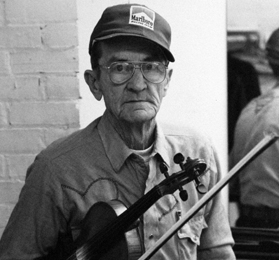Annotation:Ford One-Step: Difference between revisions
m (Text replacement - "Century Gothic" to "sans-serif") |
m (Text replacement - "<div style="text-align: justify; direction: ltr; margin-bottom: 90px; margin-left: 70px; margin-right: 120px;">" to "<div style="text-align: justify;">") |
||
| Line 8: | Line 8: | ||
<div style="page-break-before:always"></div> | <div style="page-break-before:always"></div> | ||
<p><font face="sans-serif" size="2"> | <p><font face="sans-serif" size="2"> | ||
<div style="text-align: justify | <div style="text-align: justify;"> | ||
<br> | <br> | ||
'''FORD ONE-STEP.''' American, Reel (cut time). C Major. Standard tuning (fiddle). AABB. The tune is sourced to Boone County, central Missouri, fiddler [[biography:Pete McMahan]] (1919-2000). A One-step is an old-time couple dance, a simpler version of the two-step. Howard Marshall <ref> Howard Marshall, "Play Me Something Quick and Devilish", 2013, p. 288.</ref> explains that it was developed during World War I: "...the 'one-step' was similar rhythmically and the same music worked, but he one-step was more accessible--danceable by even the least-experienced soldiers who were discovering nightclubs." | '''FORD ONE-STEP.''' American, Reel (cut time). C Major. Standard tuning (fiddle). AABB. The tune is sourced to Boone County, central Missouri, fiddler [[biography:Pete McMahan]] (1919-2000). A One-step is an old-time couple dance, a simpler version of the two-step. Howard Marshall <ref> Howard Marshall, "Play Me Something Quick and Devilish", 2013, p. 288.</ref> explains that it was developed during World War I: "...the 'one-step' was similar rhythmically and the same music worked, but he one-step was more accessible--danceable by even the least-experienced soldiers who were discovering nightclubs." | ||
Latest revision as of 21:32, 11 June 2019
X:1 T:Ford One-Step S:Pete McMahan (1919-2000, Columbia, Boone County, central Mo.) M:C| L:1/8 R:Reel R:Quick F:https://www.slippery-hill.com/recording/ford-one-step Z:Transcribed by Andrew Kuntz K:C g2-|gdeg- gdea-|agea- ageg-|gdeg- gde2|[d3g3][dg]- [d2g2]g2-| gdeg- gdea-|agea- ageg-|gdeg- gde2|[E3c3][Ec]- [E2c2]:| |:A,B,|C2C2EG G^F|[=F2A2][F2A2]Ad2c| BGBd A^FAF|G=FGA GFED| [C2E2][C2E2] EG G^F|[=F2A2][F2A2]Ad2c| BGBd AGEG|[E3c3][Ec]- [E2c2]:|]
FORD ONE-STEP. American, Reel (cut time). C Major. Standard tuning (fiddle). AABB. The tune is sourced to Boone County, central Missouri, fiddler biography:Pete McMahan (1919-2000). A One-step is an old-time couple dance, a simpler version of the two-step. Howard Marshall [1] explains that it was developed during World War I: "...the 'one-step' was similar rhythmically and the same music worked, but he one-step was more accessible--danceable by even the least-experienced soldiers who were discovering nightclubs."

- ↑ Howard Marshall, "Play Me Something Quick and Devilish", 2013, p. 288.
